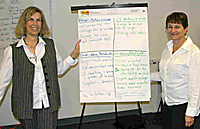By Janis Siegel, JTNews Correspondent
“You have to listen to me.”
“I want your attention.”
“You’re ordering me around — how insulting!”
“These are problems that must be solved.”
“I disagree with your point of view.”
“There’s no room for discussion.”
No, this is not a transcript from Dr. Phil’s latest self-help book on marriage or even a manual on how to fight fair.
These are a few of the thoughts that often go unspoken in business meetings between Americans and Israelis, according to two former Fortune 500 communications consultants who say that knowing what motivates and drives businesspeople in the two countries can lead to faster, better, cheaper, and more adaptable solutions — from engineering to marketing.
Corporate communication experts Vivian Deutsch and Anat Kedem, the keynote speakers at the Washington-Israel Business Council’s October meeting, say that if the different styles aren’t explained, then the best qualities of each group can be lost. And even worse, that great ideas may never get off the ground.
“The assumption is that the U.S. is very compatible with Israel, and that [business communications are] going to be very similar because English is common in Israel, and because we’ve seen “Seinfeld” and “Friends,” Deutsch told JTNews from her home in Palo Alto, Calif., in the heart of Silicon Valley. “But I’ve heard it from voluntary organizations, Jewish day schools, and the public sector. I think it’s always a problem and it’s always there.”
Their presentation, “What’s the Problem? Working Effectively Across the Israeli-American Cultural Interface,” was developed to start the conversation between the two groups.
Deutsch and Kedem’s consulting firm, The Israeli-American Intercultural Advantage, offers its clients the knowledge and expertise each has earned from 20 years of corporate communications consulting for companies including Motorola, Dialogic, Orboteck, Intel and Amdocs.
“What we’ve found is that if the differences go unaddressed,” said Kedem, “they get more and more pronounced. The Israeli style is to continue improvising and to find a better way. Americans are concerned with getting the product there in time. But both sides want the same bottom line.”
Kedem was born and raised in Israel and holds a master’s degree in Education and Training from Haifa University. She is a graduate of the Intercultural Communication Institute in Portland, Ore., and the Gestalt Institute of Cleveland. Kedem has lived in Israel, the U.S. and South Africa.
Deutsch grew up in the U.S., and has lived in Israel, Europe and Kenya. She too earned her master’s degree at Haifa University, but her degree was in Applied Cultural Anthropology in Business. Deutsch also has certifications from Columbia University and the Technion-Israel Institute of Technology in Organizational Development. Her work at the Technion included human resources management.
The two women now focus solely on American-Israeli relations, helping dealmakers and entrepreneurs in both countries make their deals with better results. This is their first time working together in Seattle.
“Many of the Israelis in Washington have been here for years, so they’re adapted to the American style,” says Bernel Goldberg, executive director of the WIBC and an attorney with the law firm Garvey Schubert Barer. Goldberg lived and worked as an attorney in Israel for eight years, “doing a lot of deals” between Americans and Israelis.
“It’s a match made in heaven as long as the two don’t end up hating each other,” he said.
The WIBC is primarily an educational and partnership organization focused on building relationships between Israeli and American high-tech companies in areas of mutual compatibility such as aerospace, biotechnology, the environment, homeland security and more.
“There’s no ill will here,” added Goldberg. “Israelis are fantastic with technology and products and the Americans bring their marketing expertise. Usually, in a meeting, Israelis, who are prone to exaggeration, will throw out a [dollar] number. Americans will chuckle — and then get out their calculators.”
The event was co-sponsored by Silicon Valley Bank in Seattle with other speakers that included Geir Hansen, (senior vice president of Silicon Valley Bank and WIBC Board Member), Kevin Twardus, (CTO for Communications Sector Solutions at IBM), Eran Megiddo, (group program manager of Excel and Access Services at Microsoft), and Frank Paterra, (vice president of corporate development at Zango, Inc.).
In his book The Art of the Deal, Donald Trump wrote that you can’t be imaginative or entrepreneurial if you’ve got too much structure. Nowhere is that approach more apparent and polarizing than between Americans and Israelis.
“Israelis don’t want to plan too much,” said Deutsch. “They tend to think that the big idea is really ‘it’ and [that] we’ll figure out the details later. They want Americans to say, ‘Yeah, that’s great.’ They are incredibly innovative. They are second or third after Japan for patents. For such a small population, Israel has an incredible amount of ideas.”
And what are Americans thinking?
“Israelis tend to make Americans feel uncomfortable,” said Kedem. “Americans want to map it out with every little detail but Israelis think that’s a burden. Americans have a plan and make a decision. They are very systematic, which helps on the execution side. But seeing the lack of detail, they can also miss the ‘great idea,’ because they don’t understand the Israeli modus operandi. So a really great business might not get off the ground because of that. If you stifle Israeli creativity, you may really miss out.”
IAIA uses interactive exercises, role-playing and examples from their clients’ business situations to walk through the process, help to ask the right questions, and interpret the clues.
“Once we talk to people we see the light bulbs going on,” adds Kedem. “They each respect each other because [the] high-tech culture provides common ground. Our challenge is to prove to them that it does impact the bottom line.”
